| Srl | Item |
| 1 |
ID:
127115
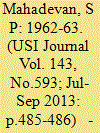

|
|
|
| 2 |
ID:
121720
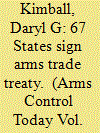

|
|
|
|
|
| Publication |
2013.
|
| Summary/Abstract |
Senior diplomats from 67 European, Latin American, Asian, and African states signed the Arms Trade Treaty (ATT) at the United Nations on June 3.
|
|
|
|
|
|
|
|
|
|
|
|
|
|
|
|
| 3 |
ID:
185323
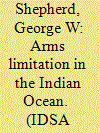

|
|
|
| 4 |
ID:
095515
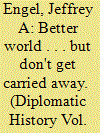

|
|
|
| 5 |
ID:
127659
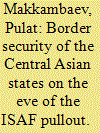

|
|
|
|
|
| Publication |
2013.
|
| Summary/Abstract |
For over 30 years now, the conflict in Afghanistan has been and remains a source of international and regional instability. The crisis developments emerging in the territory of this country threaten the border security of the Central Asian states; what will happen in Afghanistan after the ISAF pullout is causing even more concern.
The author analyzes the impact of the Afghan conflict on the border security of the Central Asian states and concludes that bilateral and multilateral efforts to preserve border security should be improved to stave off the threats that might emanate from Afghanistan.
|
|
|
|
|
|
|
|
|
|
|
|
|
|
|
|
| 6 |
ID:
079643
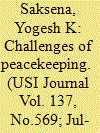

|
|
|
| 7 |
ID:
051589
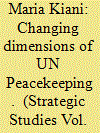

|
|
|
| 8 |
ID:
116357
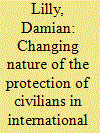

|
|
|
|
|
| Publication |
2012.
|
| Summary/Abstract |
The protection of civilians is a priority in most international peace operations today. There are important differences in the concept, however, in the operations undertaken for example by the UN, NATO, EU and the AU. In particular, a distinction needs to be made between the protection of civilians in 'peacekeeping' as compared to 'peace enforcement' operations. While in the former a 'proactive' approach to protecting civilians is usually adopted, in the latter a 'reactive' approach is normally required. These theoretical differences present important implications for those decision-makers mandating the operations as well as those involved in planning and implementing them in the field.
|
|
|
|
|
|
|
|
|
|
|
|
|
|
|
|
| 9 |
ID:
138082
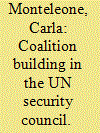

|
|
|
|
|
| Summary/Abstract |
Political coalitions in the international system are still understudied in International Relations theory. This article claims that the formation of and variations in coalitions in the international system are affected by changes in their bargaining power and bargaining environment related to the global leadership cycle and by long-term organisational changes of the international political system. Identifying the Security Council as the institution in which states are more likely to keep their systemic preferences at the institutional level, the article studies the presence, formation and change of coalitions in the international system by testing variations in the behaviour of the Security Council members in the period 1993–2012. To overcome methodological difficulties, it proposes to analyse sponsoring rather than voting behaviour. In the analysed period, the presence of a mutating dominant coalition, signs of potential coalitions in the making and an increase in participation and competition resulting from modifications in the organisational form of the international system are found.
|
|
|
|
|
|
|
|
|
|
|
|
|
|
|
|
| 10 |
ID:
012467
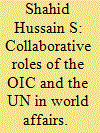

|
|
|
|
|
| Publication |
April 1997.
|
| Description |
21-27
|
|
|
|
|
|
|
|
|
|
|
|
|
|
|
|
| 11 |
ID:
088133
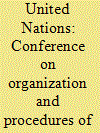

|
|
|
|
|
| Publication |
New York, New Paltz, 1971.
|
| Description |
47p.
|
|
|
|
|
|
|
|
|
|
|
|
Copies: C:1/I:0,R:0,Q:0
Circulation
| Accession# | Call# | Current Location | Status | Policy | Location |
| 006662 | 354.103/UNI 006662 | Main | On Shelf | General | |
|
|
|
|
| 12 |
ID:
098081
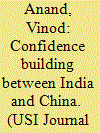

|
|
|
| 13 |
ID:
068427


|
|
|
|
|
| Publication |
New Delhi, India Research Press, 2006.
|
| Description |
xvi, 816p.hbk
|
| Standard Number |
8187943572
|
|
|
|
|
|
|
|
|
|
|
|
Copies: C:1/I:0,R:0,Q:0
Circulation
| Accession# | Call# | Current Location | Status | Policy | Location |
| 051033 | 954.0358092/CHA 051033 | Main | On Shelf | General | |
|
|
|
|
| 14 |
ID:
058963
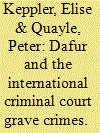

|
|
|
| 15 |
ID:
068175
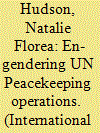

|
|
|
| 16 |
ID:
098962
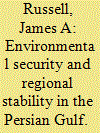

|
|
|
| 17 |
ID:
085346
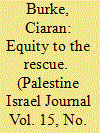

|
|
|
|
|
| Publication |
2008.
|
| Summary/Abstract |
The United Nation Charter war-i.e., the use of force by states across borders - illegal in all but two circumstances, these being self-defense and collective action authorized by the Security Council.
|
|
|
|
|
|
|
|
|
|
|
|
|
|
|
|
| 18 |
ID:
118663
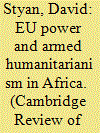

|
|
|
|
|
| Publication |
2012.
|
| Summary/Abstract |
This article analyses the European Union's (EU's) largest European Security and Defence Policy (ESDP) military mission outside Europe to date; Eufor Tchad/RCA was a 3700-strong force involving personnel from 23 states, deployed to Chad and the Central African Republic for 12 months from March 2008. Far from this mission achieving EU 'supremacy' or projecting an 'imperial' reach, an evaluation of its objectives and achievements reveals acute limitations in the EU's ability to project power. The article analyses the context in which Eufor was conceived and deployed. It notes that the mission's weaknesses, like those of the United Nations mission to whom the EU transferred its security role in 2009, reflected its convoluted origins and objectives. Finally, the article examines whether the EU as a unitary actor has the desire or the ability to 'replace' individual European nations-in this case France-in their post-colonial military and 'humanitarian' roles in sub-Saharan Africa.
|
|
|
|
|
|
|
|
|
|
|
|
|
|
|
|
| 19 |
ID:
151678
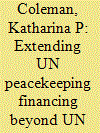

|
|
|
|
|
| Summary/Abstract |
Adequate financing is fundamental to the success of any peace operation. In June 2015, the High-Level Independent Panel on Peace Operations advanced three proposals that would extend UN peacekeeping financing beyond its current boundaries to produce a more comprehensive system of funding peace operations. It advocated giving UN special political missions access to backstopping and transitional funding mechanisms created for peacekeeping operations; providing more predictable financing for UN-mandated African Union–led peace operations; and establishing a single peace operations account to finance all UN peace operations. Yet reforming UN peacekeeping financing is notoriously difficult, not least because of deeply politicized cleavages among member states.
|
|
|
|
|
|
|
|
|
|
|
|
|
|
|
|
| 20 |
ID:
111739
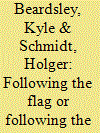

|
|
|
|
|
| Publication |
2012.
|
| Summary/Abstract |
This paper compares the explanatory power of two models of UN intervention behavior: (i) an "organizational mission model" built around the proposition that variations in the amount of resources that the UN devotes to different conflicts primarily reflect the degree to which a conflict poses a challenge to the UN's organizational mandate of promoting international peace and stability and (ii) a "parochial interest model" that revolves around the purely private interests of the five veto-holding members of the UN Security Council (the so-called P-5), i.e., interests that are either unrelated to or at odds with the UN's organizational mandate. Examining data on UN conflict management efforts in more than 270 international crises between 1945 and 2002, we find that measures of the severity and escalatory potential of a conflict are significantly better predictors of the extent of UN involvement in international crises than variables that measure P-5 interests that do not align with the UN's organizational mission of acting as a global peacemaker. This suggests that the UN adheres more closely to the humanitarian and security mission laid out in its Charter than critics of the organization often suggest.
|
|
|
|
|
|
|
|
|
|
|
|
|
|
|
|